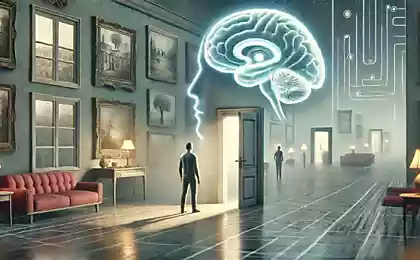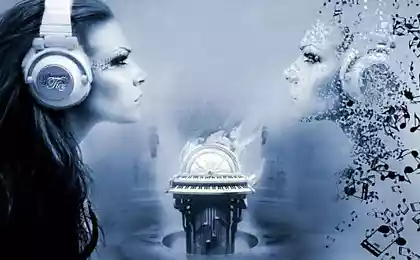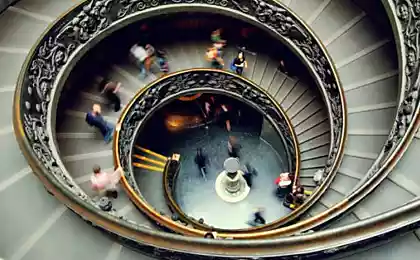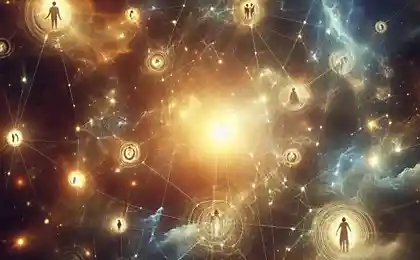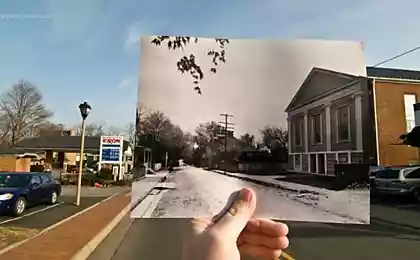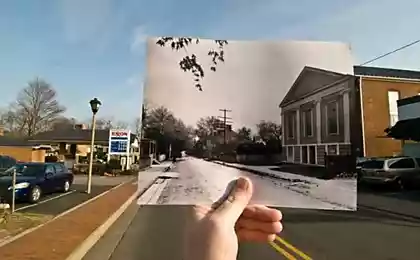673
Why there is a deja vu effect
The effect of deja vu
Many people are familiar with the phenomenon of deja vu, that is, when some ongoing activities or events are often perceived in such a way as if they had once committed. Currently, simple answer, which means the effect of deja vu is impossible - instead, you can consider a number of different hypotheses of occurrence of this phenomenon
.
You can not program the probability of deja vu. The only thing that you can remember the actions that have already occurred. Often many movies, music, even people who seem to us something of the old, familiar, half-forgotten, but remember where and how we got to know them, it is impossible. At the same time there is a feeling as if there is something magic, created an illusion. Although soon it is a "magical" state disappears and returns to their seats, thus leaving only more questions.
As a rule, children are not familiar déjà vu. Experts believe that they have not yet formed the consciousness of this (ie, they do not notice such effects). There is a certain age, when the appearance of deja vu can reach maximum. It adolescence (16 to 18). At that time people were already sufficiently possess the personal perception of reality, but it is all too keenly perceive and react violently to everything. Also, people in middle age (35 to 40) is characterized by meeting with this inexplicable phenomenon.
A bit of history the discovery of deja vu
For the first time such a thing as "deja vu" can be found in the book of Emile Buaraka - "The future of psychology." Studies of a young scientist of the 19th century were based on ancient facts - because the phenomenon known were many prominent celebrities. Since the 19th century it took for active popular writers London, Dickens, Simak, Doyle, Tolstoy. First Buarakovskie work has been ignored, but it was impossible to write off a large number of cases, only on the mere mental disorder, so for this phenomenon eventually got the name of deja vu.
The effect of deja vu: the causes of
. The physiological hypothesis.
According to scientists, the emergence of deja vu is performed in the temporal lobe - the hippocampus. This brain region is working to look for in the memory of different analogies, and find the differences between similar pictures. Thanks to this we are able to distinguish gyrus Presents from past actions and new activities from the previously seen. But when in the hippocampus might fail, then a short time in memory seen by center enters the picture image, and then there is a request, and whether in human memory of something similar? The brain will spew has not "cooled" memories perceived as something of an obscure past. Failures in the hippocampus may be due to fatigue, depression, illness, stress, bad weather conditions.
The psychological hypothesis.
Aristotle, who, although he was not a psychologist, for the first time linked the phenomenon to a mental disorder, as, indeed, and continue to think of the followers of the teachings of Buaraka.
Various psychological studies tell us that deja vu - a characteristic symptom of epilepsy for the short-lived. People who are constantly faced with this effect, usually prone to such diseases as schizophrenia, epilepsy, as well as to a violation of temporary perception.
There is a theory that all the processes in the brain occur when deja vu to defend. Since man, trapped in an unfamiliar situation, subconsciously feels a certain negative and dangerous, so the thinking is taken to look for something familiar, to "remember" and not to panic.
The metaphysical hypothesis.
According to the philosophical conception, the world is a fourth dimension, where reality blurs the line. We exist here and now, while at the same time with us also coexists future and past actions.
If you follow this concept, that deja vu may well be due to a failure in the 4th dimension, and as if by accident we read the information that we are not meant - if briefly become witnesses of future events. If we consider parapsychology: deja vu - the memory of a distant past. This is also the opinion of Pythagoras. Freud described the deja vu as real memories, but especially artificially "zatёrtye" our subconscious. Jung associated the phenomenon of the collective unconscious - that is, with the memory of ancestors.
Many people are familiar with the phenomenon of deja vu, that is, when some ongoing activities or events are often perceived in such a way as if they had once committed. Currently, simple answer, which means the effect of deja vu is impossible - instead, you can consider a number of different hypotheses of occurrence of this phenomenon
.

You can not program the probability of deja vu. The only thing that you can remember the actions that have already occurred. Often many movies, music, even people who seem to us something of the old, familiar, half-forgotten, but remember where and how we got to know them, it is impossible. At the same time there is a feeling as if there is something magic, created an illusion. Although soon it is a "magical" state disappears and returns to their seats, thus leaving only more questions.
As a rule, children are not familiar déjà vu. Experts believe that they have not yet formed the consciousness of this (ie, they do not notice such effects). There is a certain age, when the appearance of deja vu can reach maximum. It adolescence (16 to 18). At that time people were already sufficiently possess the personal perception of reality, but it is all too keenly perceive and react violently to everything. Also, people in middle age (35 to 40) is characterized by meeting with this inexplicable phenomenon.
A bit of history the discovery of deja vu
For the first time such a thing as "deja vu" can be found in the book of Emile Buaraka - "The future of psychology." Studies of a young scientist of the 19th century were based on ancient facts - because the phenomenon known were many prominent celebrities. Since the 19th century it took for active popular writers London, Dickens, Simak, Doyle, Tolstoy. First Buarakovskie work has been ignored, but it was impossible to write off a large number of cases, only on the mere mental disorder, so for this phenomenon eventually got the name of deja vu.
The effect of deja vu: the causes of
. The physiological hypothesis.
According to scientists, the emergence of deja vu is performed in the temporal lobe - the hippocampus. This brain region is working to look for in the memory of different analogies, and find the differences between similar pictures. Thanks to this we are able to distinguish gyrus Presents from past actions and new activities from the previously seen. But when in the hippocampus might fail, then a short time in memory seen by center enters the picture image, and then there is a request, and whether in human memory of something similar? The brain will spew has not "cooled" memories perceived as something of an obscure past. Failures in the hippocampus may be due to fatigue, depression, illness, stress, bad weather conditions.
The psychological hypothesis.
Aristotle, who, although he was not a psychologist, for the first time linked the phenomenon to a mental disorder, as, indeed, and continue to think of the followers of the teachings of Buaraka.
Various psychological studies tell us that deja vu - a characteristic symptom of epilepsy for the short-lived. People who are constantly faced with this effect, usually prone to such diseases as schizophrenia, epilepsy, as well as to a violation of temporary perception.
There is a theory that all the processes in the brain occur when deja vu to defend. Since man, trapped in an unfamiliar situation, subconsciously feels a certain negative and dangerous, so the thinking is taken to look for something familiar, to "remember" and not to panic.
The metaphysical hypothesis.
According to the philosophical conception, the world is a fourth dimension, where reality blurs the line. We exist here and now, while at the same time with us also coexists future and past actions.
If you follow this concept, that deja vu may well be due to a failure in the 4th dimension, and as if by accident we read the information that we are not meant - if briefly become witnesses of future events. If we consider parapsychology: deja vu - the memory of a distant past. This is also the opinion of Pythagoras. Freud described the deja vu as real memories, but especially artificially "zatёrtye" our subconscious. Jung associated the phenomenon of the collective unconscious - that is, with the memory of ancestors.

